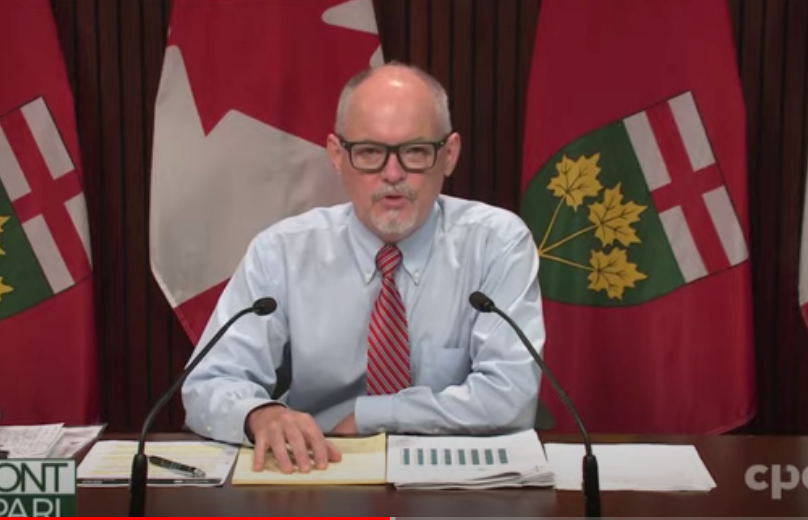With COVID-19 vaccine boosters being expanded to include more people, the province is detailing how that will happen.
Today, chief medical officer of health Dr. Kieran Moore announced third doses are rolling out.
“Keeping a low rate of infection in our communities and protecting our most vulnerable is how we can keep our schools, businesses and social settings as safe as possible while avoiding further lockdowns,” said Moore in a news release.
“To provide every individual the best protection while learning to live with the virus for the long-term, we are prepared to expand booster eligibility to all Ontarians pending clinical recommendations, with eligibility expanding this week to individuals who face a higher risk of contracting COVID-19.”
Four new groups — about 2.75 million people — now qualify for an mRNA vaccine booster.
People eligible for the third shot will be able to book an appointment starting Saturday, Nov. 6. The locations and timing for these doses may vary by the public health unit area.
Those now eligible are people 70 years and older, healthcare workers and designated essential caregivers, people who received two doses of the AstraZeneca vaccine or one dose of the Janssen vaccine, as well as First Nation, Inuit and Métis adults and non-Indigenous people living in the same household.
Appointments can be booked through the COVID-19 vaccination portal or by calling the provincial vaccine contact centre at 1-833-943-3900 at 8 a.m. on Saturday, through public health units that use their own booking system, and select pharmacies.
Some primary care providers are delivering the booster doses, but people are asked not to call asking for an appointment. Health-care workers in hospitals are encouraged to reach out to their employer to get vaccinated through the hospital's vaccination program.
For First Nation, Inuit and Métis people — including non-Indigenous household members, boosters will be offered at mass immunization clinics, pharmacies, pop-ups, as well as the other clinics being offered. Self-attestation is required.
There will be follow-up efforts by First Nation-led clinics, health centres and programs such as Operation Remote Immunity in the far north for people living in First Nation communities.
Timing
Eligibility for booster shots is based on age and risk. Booster doses are being recommended six to eight months after receiving a second dose.
In Ontario, boosters started rolling out on Aug. 17. The province expects the third doses will expand to the general population in early 2022.
The National Advisory Committee on Immunization is also now recommending an "optimal" eight-week interval between first and second doses.
Children's vaccines
For children five to 11 years, Health Canada received Pfizer's submission in October for the children's vaccine. The province is anticipating first doses will start to roll out to that population later this month.
The government has received plans for children's vaccinations from all public health units.
The vaccination plan includes mass immunization clinics, school-based clinics, pharmacies, primary care providers, mobile teams and children's hospitals.
The province says a parent or guardian will, for the most part, provide consent before their child can receive the vaccine, according to today's update. Consent forms will be sent home and also be available online.
Today, Public Health Ontario reported 378 new COVID cases, as well as 380 recoveries and five new deaths.
Today's cases include 183 unvaccinated people, 12 partially vaccinated, 142 fully vaccinated people and 41 with unknown vaccination status.
Right now in Ontario, more than 11 million people are fully vaccinated. A person is considered fully vaccinated 14 days after their second dose.
Of the eligible population 12 years and up, 88.3 per cent of people have their first dose and 84.7 per cent have their second dose.
A vaccine passport proving that you're fully vaccinated is currently required to access certain high-risk public indoor spaces such as restaurants or gyms. The province has announced its plan to lift public health measures by March 22, 2022.



